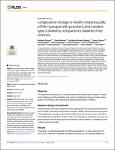Longitudinal change in health-related quality of life in people with prevalent and incident type 2 diabetes compared to diabetes-free controls
Schunk, Michaela
Reitmeir, Peter
Rückert-Eheberg, Ina-Maria
Tamayo, Teresa
Schipf, Sabine
Meisinger, Christa
Peters, Annette
Scheidt-Nave, Christa
Ellert, Ute
Hartwig, Saskia
Kluttig, Alexander
Völzke, Henry
Holle, Rolf
Objective: The objective of this analysis is to compare people with prevalent type 2 diabetes, incident type 2 diabetes and without diabetes with respect to longitudinal change in health-related quality of life (HRQOL) when adjusting for baseline determinants of HRQOL. Research design and methods: Primary baseline and follow-up data from three regional and one national population-based cohort studies in Germany were pooled for analysis. HRQOL was measured using physical and mental health summary scores (PCS and MCS) from the German version of the Short Form Health Survey with 36 or 12 items. Mean score change per observation year was compared between the three groups (prevalent diabetes, incident diabetes, no diabetes) based on linear regression models. Results: The analysis included pooled data from 5367 people aged 45–74 years at baseline. Of these, 85.5% reported no diabetes at baseline and follow-up, 6.3% reported diabetes at both baseline and follow-up (prevalent diabetes), and 8.2% reported diabetes only at follow-up (incident diabetes). Over a mean observation period of 8.7 years, annual decline in HRQOL scores is pronounced at 0.27–0.32 (PCS) and 0.34–0.38 (MCS) in the group with prevalent diabetes compared with people without diabetes. Those with incident diabetes showed intermediate values but did not differ significantly from people without diabetes after adjustment for covariates in the full model. Conclusion: Compared with data from cross-sectional analysis, the HRQOL loss associated with prevalent diabetes appears to be much larger than previously assumed.
Dateien zu dieser Publikation
Keine Lizenzangabe

